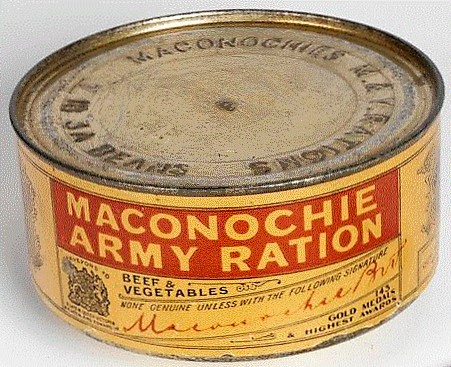
Maconochie Brothers was a company set up in 1873 by Archibald (1854-1926) and James (1850-1895) Maconochie. (Maconochie is a surname derived from the Gaelic Macdonochie, the son of Duncan.)
With food processing plants on the Isle of Dogs (London), in Lowestoft (Suffolk), in Fraserburgh (Aberdeenshire, Scotland) and other places, the company was a wholesale provision merchant and manufacturer of pickles, potted meat and fish, jam, marmalade and other preserved foods.
The earliest mention of the company that I could find is from The Norwich Mercury (Norfolk) of 18th April 1874:
TO BUILDERS AND CONTRACTORS.
TENDERS are required for the ERECTION OF FISH CURING PREMISES, STORES, OFFICES, &c., for Messrs. Maconochie Brothers, of Lowestoft and London, on their Land, situated in North Raglan Street, Lowestoft.
Plans and specifications may be inspected on and after Wednesday, 22nd Instant.
Sealed tenders, endorsed “Tenders for Works,” to be delivered at my Office no later than Saturday, the 2nd of May, 1874.EDGAR GOFF,
Architect and Surveyor.
Old Post Office,
High Street, Lowestoft.
Messrs. Maconochie Brothers do not pledge themselves to accept the lowest or any tender.
Evidence of the commercial success of the company is found in The Aberdeen Journal of 12th April 1886; an article about the herring preserving industry refers
to Messrs Maconochie Brothers, the well-known fish factors of Lowestoft. Their herring preserving works at Fraserburgh, which we have inspected, are the largest premises of the kind in the United Kingdom—probably in the world—and millions of tins of fish have found their way from this factory into every part of the habitable globe.
The company won a huge contract to supply the British Army with a tinned stew of meat and vegetables during the Boer War (1899-1902). This was mentioned in The People’s Journal (Aberdeen) of 30th September 1899:
A large number of local tinsmiths, butchers, female fish workers, &c., have within the last few days left for London, where they will be employed in the preserving works of Messrs Maconochie Brothers. It is hinted that a Government contract in connection with the probable South African campaign accounts for the extraordinary pressure at the works.
More than a decade later, at the outbreak of World War One, the contract was still in place. So Maconochie’s stew was again the M&V (meat and veg) tinned ration universally used by the troops, who either welcomed or hated (mostly the latter) the foods supplied.
Already, during the Boer War, Erskine Childers (1870-1922) was not enthusiastic, as this passage from his 1900 book In the Ranks of the C.I.V.* shows:
The ration now is five biscuits (the full ration) and a Maconochie, or bully beef. Only extreme hunger can make me stomach Maconochies now. They are quite sound and good, but one gets to taste nothing but the chemical preservative, whatever it is.
(* CIV: City of London Imperial Volunteers)
But it is during World War One that the Maconochie ration became infamous. An article titled Trench Talk: Some Characteristic Slang Creations of the Soldiers, published in the American Everybody’s Magazine of January 1918, has:
You always have your “rooty” or bread and your “gippo” or bacon-grease soup and your “machonochie”, or tin of scientifically balanced ration, the compounder of which is said to be marked for the last atrocity victim of the war.
The very same idea was expressed by the American author, screenwriter, actor and film producer Arthur Guy Empey (1883-1963) in Tommy’s dictionary of the trenches (appended to Over the Top, by an American soldier who went – 1917):
Maconochie. A ration of meat, vegetables, and soapy water, contained in a tin. Mr. Maconochie, the chemist who compounded this mess, intends to commit “hari kari” [sic] before the boys return from the front. He is wise.
More generally, Arthur Guy Empey described with the same humour the food served to the British soldiers:
Stew. A concoction of the cook’s which contains bully beef, Maconochie rations, water, a few lumps of fresh meat, and a potato. Occasionally a little salt falls into it by mistake. Tommy is supposed to eat this mess ― he does ― worse luck!
Spud. Tommy’s name for the solitary potato which gets into the stew. It’s a great mystery how that lonely little spud got into such bad company.
The word Maconochie came to be used figuratively.
The shape of the tin was associated with that of a telephone receiver, and, by metonymy, the content of the tin designated the stomach; the following is from Soldier and Sailor Words and Phrases (1925), compiled by Edward Fraser and John Gibbons:
The shape of the tin suggested further the expression “Shake up your Maconochie”, for “Shake up the telephone receiver”. The word was also sometimes used for stomach, e.g., “He got hit in the Maconochie”.
In The Mud Larks Again (1919), the poet and novelist Crosbie Garstin (1887-1930) recorded another sense of Maconochie:
Algy sniffed. “What’s that big brute over in the corner? […] Looks like a bloodhound.”
“It’s a bloodhound,” said Albert Edward.
[…]
“And these? What breed would you call them?”
Albert Edward grunted. “You could call them any breed you like and be partly right. We’ve named them ‘The Maconochies,’ which, being interpreted, meaneth a little of everything.”
And, perhaps because of a similarity of pronunciation, Maconochie Cross was slang for the Military Cross, and Maconochie Medal for the Military Medal.
Not all the foods produced by Maconochie Brothers were disliked. In fact, their Pan Yan Pickle has long been a household favourite in Britain.
advertisement for Pan Yan Pickle in The Bedfordshire Times and Independent of 1st May 1936

